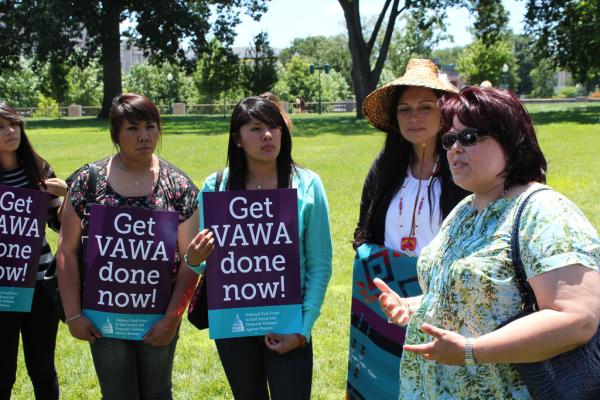Three pilot tribes have been chosen by the Obama Administration to take early advantage of Violence Against Women Act (VAWA) provisions passed by Congress last year that allow tribes to prosecute non-Indian offenders for domestic violence offenses on reservations.
The Justice Department announced February 6 that the Pascua Yaqui Tribe of Arizona, the Tulalip Tribes of Washington, and the Umatilla Tribes of Oregon will be the first in the nation to be able to exercise criminal jurisdiction over certain crimes of domestic and dating violence, regardless of the defendant’s Indian or non-Indian status, under the 2013 VAWA law.
“Our actions today mark a historic turning point,” Associate Attorney General Tony West said in a press release announcing the decision. “We believe that by certifying certain tribes to exercise jurisdiction over these crimes, we will help decrease domestic and dating violence in Indian country, strengthen tribal capacity to administer justice and control crime, and ensure that perpetrators of sexual violence are held accountable for their criminal behavior.”
Beyond this pilot required by Congress, the law allows increased tribal jurisdiction to go into effect for all tribes in the lower 48 states in March 2015. Tribes at that time will not need Justice Department approval if they meet provisions of the law required for enhanced jurisdiction over domestic and dating violence cases.
Justice officials said West chose the three tribes for pilot participation because their tribal court systems have adequate safeguards in place to fully protect defendants’ rights under the Indian Civil Rights Act of 1968. They further said the decision to choose the three tribes were based on reviews of application questionnaires submitted by the tribes in December 2013, along with excerpts of tribal laws and policies.
“The Tulalip Tribes is honored to be among those chosen for the Special Domestic Violence Criminal Jurisdiction pilot program,” Tulalip Chairman Mel Sheldon said in a press release. “Getting justice for our tribal members, where it concerns domestic and intimate partner violence, has been a long time coming.”
“This is very positive news for tribes,” added Troy Eid, the recent chair of the Tribal Law and Order Commission who is scheduled to testify on VAWA and other tribal justice issues before the Senate Committee on Indian Affairs February 12. “It’s wonderful to see that three were approved, and the hope is that the other tribes that submitted applications are getting strong assistance from the Department of Justice to get up and running very soon.”
Six tribes in total have applied so far to participate in the pilot project, according to the National Congress of American Indians. The three that applied that that were not approved on February 6 are still under review, said Wyn Hornbuckle, a spokesman for Justice; they are the Assiniboine and Sioux Tribes of the Fort Peck Indian Reservation, the Penobscot Indian Nation, and the Ute Indian Tribe of the Uintah and Ouray Reservation. Tribal justice advocates say Justice has shown a willingness to work with the tribes to help them be able to take part in the law, and Hornbuckle said tribes may submit applications to participate in the pilot project any time before March 7, 2015. Some tribes were opposed to the pilot portion of the law, believing they should have been given immediate increased jurisdiction upon passage of the law, but the pilot was a compromise between Senate and House legislators added into the law in 2013 so that it could gain enough support to be approved by both chambers.
Once the full law goes into effect in 2015, Eid predicts many people will be asking why tribes were not trusted for so long. “The idea that local governments should have jurisdiction over these kinds of offenses is a basic bedrock principle of the American justice system,” he says. “There is no reason for tribes not to have this local control, as do all other local communities.”
Before the 1978 Supreme Court decision opinion in Oliphant v. Suquamish Indian Tribe, federally recognized tribes were widely able to exercise criminal jurisdiction over non-Indian defendants. Since that decision, which severely limited tribal sovereignty, tribes and the federal government have documented large amounts of domestic violence and dating violence committed by non-Indian abusers, yet tribes have not been able to prosecute these offenders, and the federal government has been slow to curb the problem with its own justice system.
In conjunction with the announcement, administration officials cited on the White House blog a recent study by the Centers for Disease Control and Prevention that found 46 percent of Native American women have experienced rape, physical violence, and/or stalking by an intimate partner in their lifetime.
Tribal leaders and advocates spent much of 2012 and 2013 pushing for tribal jurisdictional provisions to be restored in the VAWA reauthorization against intense Republican opposition. After a prolonged battle in Congress, they were finally successful when the reauthorization was signed into law by President Barack Obama in March 2013.
RELATED: President Barack Obama’s VAWA Law Signing Spotlights Native Women Warriors
“We lift our hands to all those who fought for the reauthorization of the Violence Against Women Act, including our own Tulalip Tribes councilwoman, Deborah Parker,” Sheldon added.
Alaska Natives, meanwhile, are currently waging a campaign for passage of a congressional VAWA fix that would give their tribal communities jurisdiction over similar domestic and dating offenses. Sens. Lisa Murkowski (R-Alaska) and Mark Begich (D-Alaska) have introduced legislation called the Safe Families and Communities Act, which does not go nearly as far as the 2013 VAWA law in increasing tribal jurisdiction over non-Indian domestic violence and dating offenders.
Alaska Natives are pressuring Begich, who is in a close re-election race, to support a congressional fix that will treat Alaska Native communities the same as tribes in the rest of the country on jurisdictional matters. Alaska Native tribes make up 40 percent of all federally recognized tribes.
Read more at http://indiancountrytodaymedianetwork.com/2014/02/06/three-tribes-begin-prosecuting-non-indian-domestic-violence-offenders-153449

